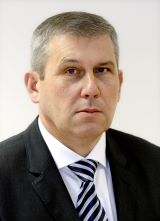PODCASTS
Listen to podcasts from the 10th EMN Educational Seminar on Migration 2024 and other EMN Slovakia's events
DAY 1 | 17 June 2024
Migration trends and policies

Photo: IOM Slovakia 2024 © Lenka Imrichova-Kandrava
Valon Halimi
Chief of Mission, International Organization for Migration (IOM) Slovakia & EMN Slovakia’s National Steering Board member
Since 2023, Valon HALIMI has been the Chief of Mission of the International Organization for Migration (IOM) in Slovakia. He has held various positions in the organisation since 1999. Most recently, he was the Chief of Mission a.i. and Liaison Officer to Frontex for IOM Poland (2022) and Officer in Charge for the IOM Belgium and Luxembourg (2021). He also served as a Senior Liaison Officer at IOM in Bamako, Mali, and as a Head of the Protection Unit in IOM Belgium. Valon has managed various projects, ranging from direct humanitarian assistance to sustainable socio-economic development in various countries including Belgium, Greece and Mali.
Opening of the seminar

ĽUDOVÍT BÍRÓ
DIRECTOR OF MIGRATION OFFICE, MINISTRY OF INTERIOR OF THE SLOVAK REPUBLIC & EMN STEERING BOARD MEMBER FOR THE SLOVAK REPUBLIC
Ľudovít BÍRÓ has been working since 2024 as the Director of the Migration Office of the Ministry of Interior of the Slovak Republic. At the same time, he represents the Slovak Republic in the European Migration Network Steering Board, he is a member of the national European Migration Network Steering Board, and also a member of the Management Board of the European Union Agency for Asylum for the Slovak Republic. He heads the Steering Committee for Migration, Integration and Inclusion of Foreigners and has been appointed as the National Contact Point for the technical part of the implementation of the EU Pact on Migration and Asylum.
He received his education at the Academy of the Police Force and during his career he worked in many positions within the Police Force. In the years 2021 – 2023 and in 2010 he served as the first deputy director of the Bureau of Border and Foreign Police of the Police Force Presidium and in the years 2010 – 2016 as its director. He also served as director (1999 – 2006) and deputy director (1998 – 1999) of the Police Detention Centre for Foreigners in Medveďov.
Ľudovít Bíró was a police attaché in the Federal Republic of Germany in Berlin from 2016 to 2021 and a police attaché in Austria in Vienna from 2006 to 2010.
During his career, he held the position of Slovakia's representative in the Frontex Management Board, Slovakia's representative in the Steering Group of the International Centre for Migration Policy Development (ICMPD) and Head of Delegation to the Strategic Committee on Immigration, Frontiers and Asylum (SCIFA). He also worked as the Chief Border Plenipotentiary of the Slovak Republic, as a member of the expert group for the fight against trafficking in human beings, in the Departmental Coordination Group of the Ministry of Interior of the Slovak Republic and the Steering Committee for Migration and Integration. He was a member of the Accreditation Commission of the Ministry of the Interior of the Slovak Republic for Police Education.
Opening key note speech (in Slovak language)

MAGNUS OVILIUS
HEAD OF SECTOR AND SENIOR EXPERT FOR FORECASTING, PREPAREDNESS AND POLICY MONITORING AT THE EUROPEAN COMMISSION
Magnus OVILIUS is Head of Sector and Senior Expert for the European Commission's Home Affairs Migration Forecasting, Preparedness and Policy Monitoring. He is responsible for monitoring and anticipating the developments of the EU migration flows on legal and irregular migration including asylum while regularly reporting these developments, as well as for migration risk assessment, forecasting and contingency/resilience building in EU Member States and preparedness including business continuity. Moreover, Magnus is responsible for inputs and support to policy making including through the European Migration Network, acting as Chair of the European Migration Network (EMN) which includes horizontal coordination, representation and negotiations with EU Member States, and EMN Observer countries.
Prior to that he was responsible for coordination and direction of global government relations issues and group initiatives for Smiths Group. Before joining Smiths Group, Magnus Ovilius was with the European Commission where he held various management positions including as Head of Sector, Preparedness and Crisis Management in DG Justice Freedom and Security responsible for the formulation, implementation and evaluation of European Union counter-terrorism policies that entailed defense related aspects of counter-terrorism, law enforcement led civil protection, critical infrastructure protection, crisis management, CBRNE (Chemical, Biological, Radiological, Nuclear, and Explosive materials) policies, G8 Roma/Lyon meetings and Security Research.
Topic: Introducing the New Pact on Migration – opening lecture

Vladimír Šucha
HEAD OF THE REPRESENTATION OF THE EUROPEAN COMMISSION IN THE SLOVAK REPUBLIC
Vladimir ŠUCHA is a Head of the European Commission Representation in the Slovak Republic since 2022. Before he was a senior policy adviser at UNESCO, detached from the European Commission. He was in the leading positions of the Joint Research Centre – a scientific and knowledge service of the European Commission since 2012. Before he spent 6 years in the position of director for culture and media in the Directorate-General for Education and Culture of the European Commission. Before joining the European Commission, he held various positions in the area of European and international affairs. Between 2005 and 2006, he was director of the Slovak Research and Development Agency, national body responsible for funding research. He worked at the Slovak Representation to the EU in Brussels as research, education and culture counselor (2000-2004). In parallel, he has followed a long-term academic and research career, being a full professor in Slovakia and visiting professor/scientist at different academic institutions in many countries. He published more than 100 scientific papers in peer-reviewed journals.
Topic: Evidence-based policymaking with impact – opening lecture

KOKO WARNER
DIRECTOR IOM'S GLOBAL DATA INSTITUTE, GERMANY
Koko WARNER is the Director of IOM’s Global Data Institute (GDI), leading IOM’s work to implement the IOM Migration Data Strategy 2020 – 2025 by bringing together IOM’s data expertise on data collection, analysis and sharing; migration data governance; and forecasting, among others. Koko has worked in the United Nations for over 16 years, directing research on climate change and migration, and climate risk management at the United Nations University before joining the secretariat to the UN Framework Convention on Climate Change (UNFCCC) to supervise the climate impacts, vulnerabilities and risk policy workstreams in its adaptation division.
Throughout her career with the United Nations, Koko has contributed to understanding, managing, and informing policy about adverse climate impacts. She conducted the first field-based studies of climate change and migration, and of loss and damage that informed the Paris Agreement. Prior to joining the UN system, Koko was a researcher at ETH Zürich at the WSL Federal Institute for snow and avalanche research working on comprehensive risk management in Davos, Switzerland. Koko received her PhD in Economics from the University of Vienna as a Fulbright Fellow, while working at the International Institute for Applied Systems Analysis (IIASA).
Topic: Latest migration trends in the world and migrant vulnerabilities in changing climate

NICOLE EPTING
REGIONAL REPRESENTATIVE, UNHCR REPRESENTATION FOR CENTRAL EUROPE, HUNGARY
Nicole EPTING has worked for UNHCR since 2000, in various positions throughout the world. Since October 2023 she acts as the UNHCR Representative for Central Europe covering the Republic of Slovenia, the Czech Republic, Hungary and the Slovak Republic.
In the past she held the position of Deputy Representative for UNHCR in Iraq (2021-2023), was in charge of the overall coordination of United Nations agencies and NGOs in the Rohingya emergency response, as the Principal Inter-Agency Coordinator in Cox’s Bazar, Bangladesh (2019-2021). Nicole served as UNHCR Senior Operations Manager/Islands Coordinator (2017-2019) during the refugee emergency in Greece, as UNHCR Head of Sub-Office Lesvos (2016-2017), and was responsible for coordination and partnerships for UNHCR on the island of Lesvos in Greece (2015-2016).
Nicole also served as Head of the Operations/Support Cell for the Global Protection Cluster (2013-2015) at UNHCR’s Headquarters in Switzerland and in the Division of International Protection (2004-2005).
She has been responsible for the protection of and solutions for refugees, asylum seekers, returnees, stateless people, and/or internally displaced people in Nepal (2009-2013), Bosnia and Herzegovina (2008-2009), Tanzania (2007-2008), Uganda (2005-2007) and Myanmar (2002-2004).
Topic: Forced displacement in the world and Central/Eastern European region

KARIN ATASSI
INTERCULTURAL WORKER AND INTERPRETER, BRNO MUNICIPALITY, CZECH REPUBLIC
Karin ATASSI is an experienced intercultural worker employed by the Brno City Hall since 2018. Her work essentially involves building a bridge between the Arab community living in Brno and the authorities or other public institutions.
With over 8 years of experience in the field of intercultural communication and integration, Karin plays a key role in improving understanding and cooperation between different cultural groups. She primarily works with women who are at home with children, providing them with support and assistance in navigating public services, communicating with authorities, and integrating into the local community. She also helps them develop the skills necessary for their personal and professional growth.
Through her work at the Brno City Hall, Karin has become an indispensable source of support and advice not only for the Arab community but also for public institutions seeking ways to enhance inclusion and diversity. Her passion for cultural diversity and inclusion drives her commitment to creating more harmonious and cohesive communities.
More on the work of intercultural mediators for the Brno City Hall can be found here.
Topic: Building bridges through the work of intercultural mediators in the city of Brno (in Czech language)

LENKA ŠAFRÁNKOVÁ PAVLÍČKOVÁ
SOCIOLOGIST AND PROJECT MANAGER AT SOCIOFACTOR, CZECH REPUBLIC
Lenka ŠAFRÁNKOVÁ PAVLÍČKOVÁ is a sociologist and since 2023 has been working at the research and educational company SocioFactor, where she focuses on the creation of projects with social innovation overlap and the application of research findings from social field into practice. In the area of social innovation, she has also cooperated with the Ministry of Labour and Social Affairs of the Czech Republic and currently cooperates with the Unruhe Privatstiftung, which annually grants the international award for outstanding social innovation projects Sozial Marie. Her long-term goal is to contribute to the creation of socially just public policies and measures, and to encourage the participation of those whose voices are least heard.
From 2016 to 2022, she worked at the Social Welfare Department of the Brno Municipality, where she was in charge of the comprehensive setting of the city's integration policy. She has created and led internationally awarded social innovation projects aimed at developing intercultural work within local governments. In the past, she worked in the private, then in the academic and non-profit sectors. She focused on the topic of migration and integration of foreigners, the social construction of identities and the analysis of ideologies.
Lenka is a graduate of the Faculty of Social Studies at Masaryk University, where she studied sociology, social policy and social work, and media studies and journalism.
Topic: Stereotypes from the perspective of local policy on integration of foreigners (including workshop) (in Czech language)
DAY 2 | 18 June 2024
Migrants’ rights, governance, and public perceptions of migration

Photo: N – Tomáš Benedikovič
MICHAL VAŠEČKA
SOCIOLOGIST & PROGRAMME DIRECTOR AT BRATISLAVA POLICY INSTITUTE, SLOVAKIA
Michal VAŠEČKA focuses his interests on issues of political sociology, and issues of radicalization of modernity. He is a programme director of Bratislava Policy Institute since 2017.
Michal is a founder of the Center for the Research of Ethnicity and Culture (CVEK) and served as its director between 2006-2012. In 1998-2005 he operated at the Slovak think-tank Institute of Public Affairs as a programme director on expert analysis of the Slovak transformation process with a focus on national minorities and the state of civil society in Slovakia. He has been a consultant for the World Bank in 2000-2008 and in 2011-2012.
Since 2012 Michal serves as a representative of Slovakia in the European Commission against Racism and Intolerance (ECRI) of the Council of Europe. He was a vice-chairman of the governmental committee VRAX tackling extremism and racism in Slovakia (2016-2019). Michal Vašečka serves as a non-resident research associate at the European Centre for Minority Issues, Flensburg. He is a chairman of the Editorial Board of the Slovak independent daily Denník N, and member of the Editorial Board of the Aspen Review in Prague. In 2018 Michal became a laureate of the Award for special contribution in the field human rights of Minister of Justice of Slovakia.
Michal is sociologist by background and studied at the Masaryk University in Brno. He operated at its Faculty of Social Studies in 2002-2017, at the Faculty of Social and Economic Sciences of the Comenius University in 2006-2009, and at the Bratislava International School of Liberal Arts in 2015-2023. As a visiting scholar he operated at the New School University in New York (1996-1997) and at the University of London (1998), in 2008-2009 he lectured at the Georgetown University in Washington, DC, in 2015 at the University of Michigan in Ann Arbor, in 2016 he was a scholar-in-residence in the ISGAP at Oxford University, and in 2019 at the Lac Courte Oreilles Ojibwa College, Wisconsin. Michal Vašečka is a member of the Executive Board of the Trnava University.
Topic: What are the attitudes of the public towards foreigners and migration? (in Slovak language)

ESTEFANÍA GUALLAR ARIÑO
DATA COORDINATOR, MIGRATION GOVERNANCE INDICATORS AT GLOBAL DATA INSTITUTE, INTERNATIONAL ORGANIZATION FOR MIGRATION (IOM), GERMANY
Estefania GUALLAR ARIÑO is the Data Coordinator for the Migration Governance Indicators (MGI) programme at IOM´s Global Migration Data Analysis Centre (GMDAC) in Berlin since 2023. Prior to joining GMDAC in 2020, Estefania worked as a policy analyst at UN Women in New York for over five years. In that capacity, she covered the different intergovernmental processes related to gender equality, in particular, the Commission on the Status, the Economic and Social Council and the General Assembly. From 2012-2014 she served as policy and programme officer of UN Women in Vietnam, working on the portfolio of sexual violence against women and girls and women in vulnerable situations, including migrant women.
Prior to her UN career, Estefania held different positions in the Spanish Development Agency (AECID) and in the Ministry for Foreign Affairs of Spain. Estefania holds an M.A. in International Relations and Diplomacy from the College of Europe as well as an M.A. in Political Sciences and Public Administration from the Complutense University in Madrid, Spain.
Topic: How is migration governed across the world? Enhancing migration management systems through migration policies and strategies (including workshop)

IRIS GOLDNER LANG
JEAN MONNET PROFESSOR OF EU LAW AT THE FACULTY OF LAW, UNIVERSITY OF ZAGREB, CROATIA & HOLDER OF THE UNESCO CHAIR ON FREE MOVEMENT OF PERSONS, MIGRATION AND INTER-CULTURAL DIALOGUE
Iris GOLDNER LANG is a Jean Monnet Professor of EU Law, the head of the Department of European Public Law and the Vice Dean for International and Interinstitutional Affairs and Quality Management at the University of Zagreb – Faculty of Law. She is the holder of the UNESCO Chair on Free Movement of Persons, Migration and Inter-Cultural Dialogue, a partner in the interdisciplinary project granted by Volkswagen Foundation "Algorithmic Fairness for Asylum Seekers and Refugees (AFAR)” and in the Horizon 2022 project "Protecting Irregular Migrants in Europe: Institutions, Interests and Policies (PRIME)". She has held visiting positions at University College London and at Harvard Law School, where she was a John Harvey Gregory Visiting Professor of Law and World Organization and a Fulbright Visiting Researcher. She did her LL.M. at the London School of Economics (LSE). She is the president of the Croatian Society for European Law (FIDE affiliate); a member of the Odysseus Network; Vice-Chair of the Board of Trustees of the Academy of European Law (ERA) and an ERA Forum Advisory board member. Goldner Lang was the Editor-In-Chief of the Croatian Yearbook of European Law and Policy and she is now a member of its Editorial Board and she is a member of the Editorial Board of the European Foreign Affairs Review.
She has published her research widely in the form of books, book chapters and articles in international peer reviewed journals, e.g. European Constitutional Law Review, American Journal of International Law, Journal of Human Rights, European Journal of Migration and Law and European Journal of Risk Regulation.
Topic: Courts and migrants’ rights (online)

LINDA COTTONE
PROJECT OFFICER AT IMMIGRATION AND BORDER GOVERNANCE DIVISION, INTERNATIONAL ORGANIZATION FOR MIGRATION (IOM) HEADQUARTERS, SWITZERLAND
Linda COTTONE is a lawyer and a researcher specialized in international protection of human rights, humanitarian law and the law of the sea. She joined in 2024 the IOM’s Immigration and Border Governance (IBG) and the Border and Identity Solution Unit (BIS) as Humanitarian Border Management (HBM) Officer for a temporary assignment. Linda is covering HBM portfolio, including coordinating for emergency responses and L3 missions, providing support on initiatives related to immigration administrative detention and Alternatives to Detention (ATD), Search and Rescue (SAR), Climate Action and Regularization. Linda first joined IOM through the United Nations Programme for Technical Cooperation in Developing Countries, seconded by the Government of Italy. She started in East Africa, Djibouti, implementing the mixed migration programme and, right after, the Yemeni crisis response. In West Africa she worked in Niger and in North Africa, in Libya. She also served as Italian Junior Professional Officer for the United Nations Secretariat in Algeria and in Italy, working on trafficking in persons, smuggling of migrants and the nexus between transnational organized crime and terrorism.
Before joining the IBG team, she worked at the Headquarters with the Protection Division and the International Migration Law Unit in Geneva. Previously she worked on refugee protection with UNHCR Spain and on migration with the Italian Ministry of Labor, Directorate General of Immigration and Integration Policies. She holds a PhD in international public law and international relations from the Autonomous University of Barcelona (UAB), in collaboration with the Lebanese American University (LAU) of Beirut.
Topic: The role of humanitarian border management in traditional border governance (including workshop)
DAY 3 | 19 June 2024
Climate migration and its complex interlinkages

FAHMIDA MIAH
PROGRAMME MANAGER AT CLIMATE OUTREACH, UNITED KINGDOM
Fahmida MIAH is a Programme Manager at Climate Outreach, a charity passionate about widening and deepening public engagement with climate change. Through audience research, practical guides and consultancy services, Climate Outreach helps organisations engage diverse audiences beyond the usual suspects.
Fahmida is currently developing and delivering the migration programme, exploring the intersections of climate and migrant justice. Alongside work, she helps run Bangladeshi Diaspora Climate Action (BDCA), a network of UK Bangladeshi professionals leveraging their expertise to support climate action in Bangladesh and diaspora communities in the United Kingdom.
Topic: How climate change creates the movement of people? Testimonies from across the world (including workshop)

PASCAL REYNTJENS
CHIEF OF MISSION, INTERNATIONAL ORGANIZATION FOR MIGRATION (IOM) CHAD
Pascal REYNTJENS is the Chief of Mission of the International Organization for Migration (IOM) in Chad as of September 2023. Since joining IOM in 1997, Pascal has developed expertise in a range of programming and policies related to migrants’ protection, migration governance and humanitarian response including emergencies. He is currently focusing on the coordination and partnership mechanisms on migration and humanitarian actions while working on bridging the approach on humanitarian, development, and peace nexus. Prior to Chad, Pascal has been posted in a variety of geographical locations. Amongst others, he was Chief of Mission of IOM in Mali (2019-2023), Chief of Mission in Algeria (2016-2019) and Chief of Mission of the IOM Office for Belgium and Luxembourg (2013-2016).
Topic: Climate change, conflict, and food security: perspectives from Chad (including workshop)

FRANÇOIS GEMENNE
ENVIRONMENTAL GEOPOLITICS AND MIGRATION DYNAMICS SPECIALIST, HEC PARIS, FRANCE
François GEMENNE is a professor at HEC Paris (Paris School of Advanced Business Studies), where he is the academic director of the Master in Sustainability and Social Innovation. A specialist of environmental geopolitics and migration governance, he is also a FNRS senior research associate at the University of Liège (Belgium), where he heads the Hugo Observatory, a research lab on environmental changes and migration. He is also the co-director of the Observatory on Defence and Climate of the French Ministry of Defence, at IRIS. He is a lead author for the 6th Assessment Report of the IPCC and lectures on climate change and migration policies in different universities, including Sciences Po and Sorbonne University in Paris. He has also been a guest professor at the University of Buenos Aires and the University of Economics in Bratislava.
He has worked in particular on populations displaced by environmental changes and the policies of adaptation to climate change, as well as on asylum and migration policies. He has conducted field studies in New Orleans (United States) after hurricane Katrina (2005), Tuvalu, China, Kyrgyzstan, the Maldives, Mauritius and Japan after the Fukushima disaster (2011).
He is currently coordinating two important European research projects: MAGYC, on migration governance and asylum crises, as well as HABITABLE, on migration induced by climate change. He also coordinated the DEVAST project, one of the first international projects to examine the social and political consequences of the Fukushima disaster. He has been involved in a large number of international research projects (e.g. EACH-FOR, HELIX, EDGE and MECLEP) and consultations for international organisations and the British government. In 2015, he was the recipient of a Fulbright scholarship to pursue research at Princeton University. In 2010, he was awarded the ISDT-Wernaers Prize for achievement in the communication of science to the general public. He holds a joint doctorate in political science from Sciences Po Paris and the University of Liège. He also holds a Master in Development, Environment and Societies from the University of Louvain, as well as a Master of Research in Political Science from the London School of Economics.
Topic: Myths and realities of environmental and climate migration (online)

